Secure your place at the Digiday Publishing Summit in Vail, March 23-25

This Black Friday and Cyber Monday, it’s more likely shoppers turn to ChatGPT to help with their holiday wish lists. Over the past year, AI platforms have gone mainstream with more users using them to research products, compare brands, hunt for deals and even automate purchasing.
The changes in how people shop online has caused marketers to reconsider their SEO strategies to maintain brand visibility in the new zero-click search landscape. As this year’s holiday shopping season gets underway, it could prove to be a major inflection point in determining if AI search can be a tool from discovery to conversion.
“This holiday season, AI search visibility is a leading indicator, because understanding where a brand is strong in AI search and where there are gaps helps predict performance everywhere else,” said Amos Ductan, svp of search at Razorfish.
Digiday parsed through the numbers to help pinpoint how AI search is shaping up this holiday season. Here’s what you need to know:
AI shopping becomes mainstream
Increasingly, more people are starting their product research, discovery and purchase journey within AI-powered chatbots like ChatGPT, Gemini or even AI Overview summaries. It has marked a shift from the keyword searches of traditional SEO strategies to more conversational, long-tail search queries with personalized recommendations. Marketers are taking notice.
“This shift in how consumers shop with AI assistants is also reshaping the way media budgets are planned,” said Brandy Alexander, founder and managing director of Tandemtide, a commerce and performance marketing agency. “Paid placements are now being optimized for everything from search to retail media.”
If the data signals anything, the uptick in AI search and shopping is a trend that’s expected to continue. Last year, only one in 10, or 11%, of Americans used generative AI for holiday shopping, according to cybersecurity company, HUMAN Security. This year, that figure has increased to two-thirds of Americans reportedly considering using AI to help with this year’s wish list.
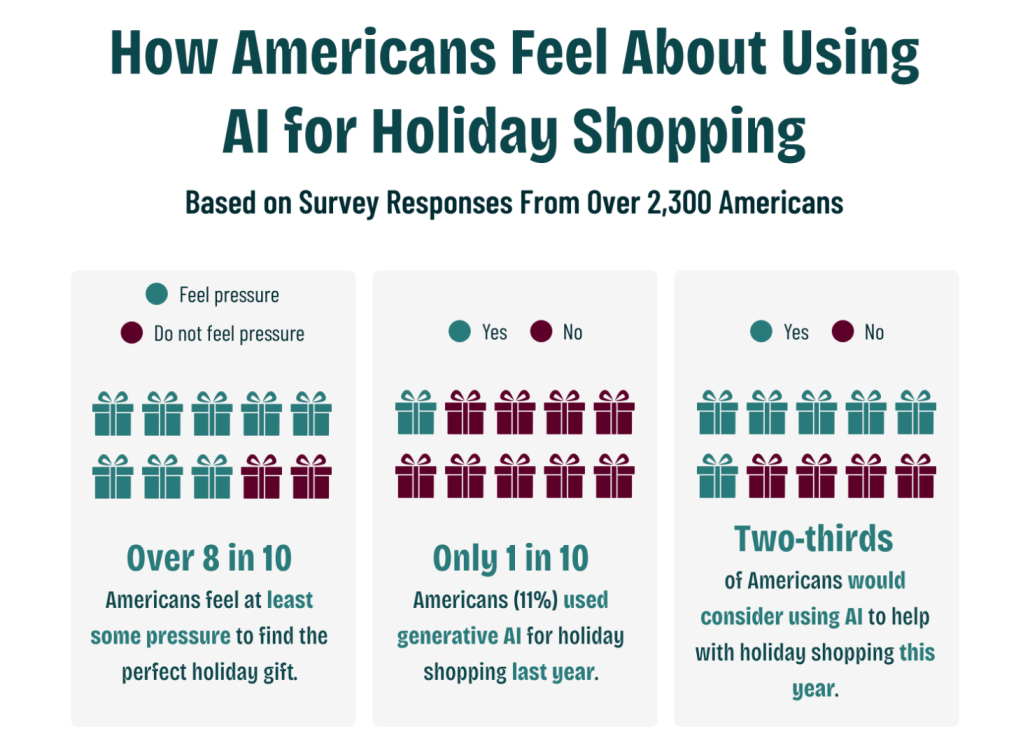
AI for research vs. shopping
It’s already established that people plan to use generative AI for this year’s holiday shopping season. The way people are using it, however, differs. New survey data published by Deloitte reveals that 56% of U.S. consumers plan to use AI chat bots to compare prices and find deals. Meanwhile, 47% plan to use AI as a reader to summarize reviews before making a decision to purchase a product. Then 33% of people plan to use it to generate shopping lists.
“This holiday season, shoppers are relying less on browsing and more on asking an AI for ‘the right answer’,” said Peter Wilmot, chief product officer at Shopsense AI, a retail media platform.
Because the way users approach generative AI tools can be fragmented, marketers are firing on all cylinders to be “agent-ready” as Wilmot puts it. He added, “The game is less about flooding channels with ads and more about placing strong product signals into formats AI already parses: creator videos, TV segments, gift guides and social content.”
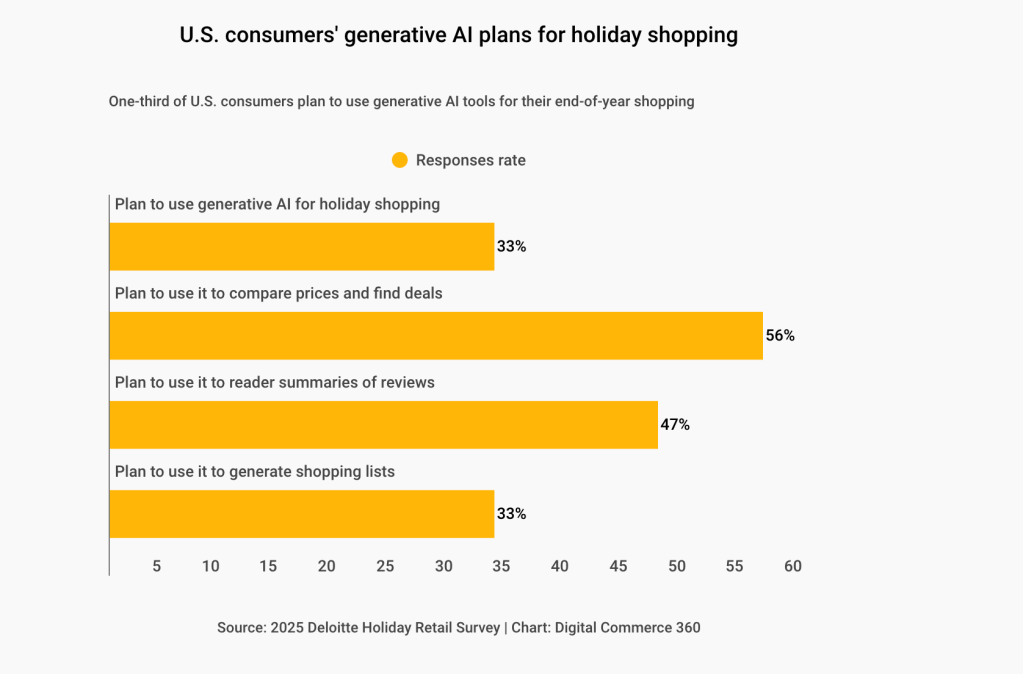
AI referrals to e-commerce brands are exploding
With recently launched AI-powered commerce features, like OpenAI’s Instant Checkout, the lines between product discovery and product purchase are blurring. This year’s holiday shopping season marks a 752% year-over-year spike in AI referrals from the likes of ChatGPT and Perplexity to e-commerce brands, according to Brightedge, an enterprise SEO and AI-powered content performance company.
Those referrals have trickled down mostly to grocery, furniture, electronics and apparel, per Brightedge research. Getting more specific, grocery brands saw a 900% increase in AI Overview presence, signaling shoppers’ turning to AI for recipe planning and everyday essentials.
Some industries are feeling the effects more than others with the introduction of AI search, said Jen Cornwell, senior director of AI SEO on the innovation and growth team at Tinuiti. Given there’s limited user data available, marketers struggle to read the tea leaves to understand impact and opportunity in the AI search landscape.
“As a result, many brands are still going all in in an effort to future-proof themselves for an AI-led future of search,” she added.
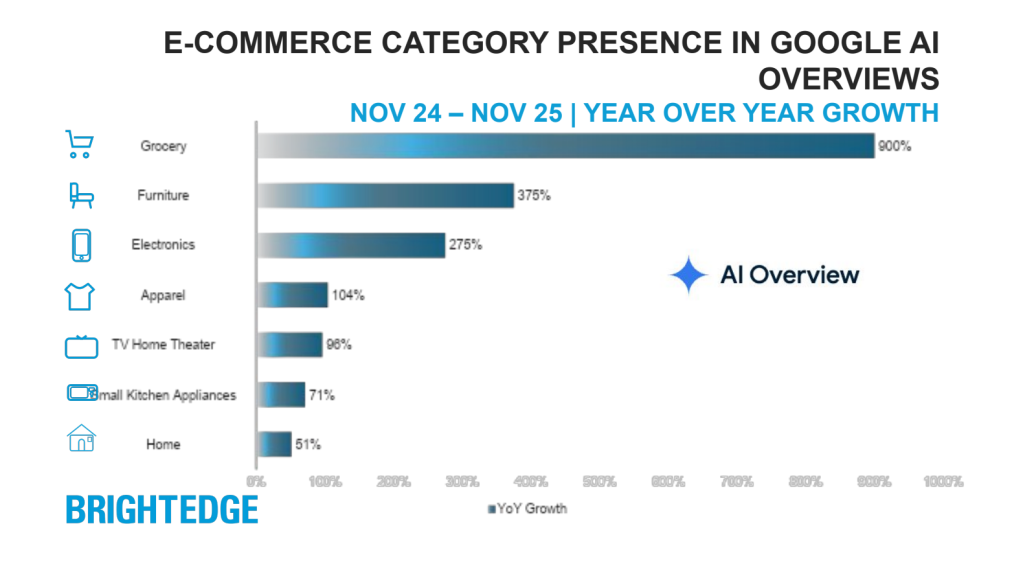
Fragmentation in the marketplace
True, AI search is gaining momentum. Marketers, however, maintain that the eulogy for traditional SEO strategies shouldn’t be prepared just yet. Google remains the go-to search engine with more than half of U.S. consumers reportedly preferring to use it over AI platforms, according to eMarketer. Beyond Google, the IAB reports that in AI shopping sessions, nearly 80% of people visited a retailer or marketplace to validate their purchase decisions. Meanwhile 32% of people went to an online retailer or marketplace directly after using AI to validate purchase decisions. All said, there’s an interactivity that exists as LLMs pull from various news sites, social platforms and retailers, and personalizes recommendations to those same places.
“AI search is all about influence, which extends to downstream conversions across existing platforms,” said Razorfish’s Ductan. “Brands that try to optimize for AI search in isolation will miss the point.”
A number of retailers have launched their own AI chatbot initiatives, like Walmart’s Sparky or Amazon Rufus. Some brands are taking similar steps, per Tandemtide’s Alexander.
“A custom GPT can guide shoppers and turn catalog searches into a conversational experience,” she said. The agency has built a custom GPT for its client Addison and Sheffield, a curated giftshop, set to launch Dec. 1, Alexander told Digiday.
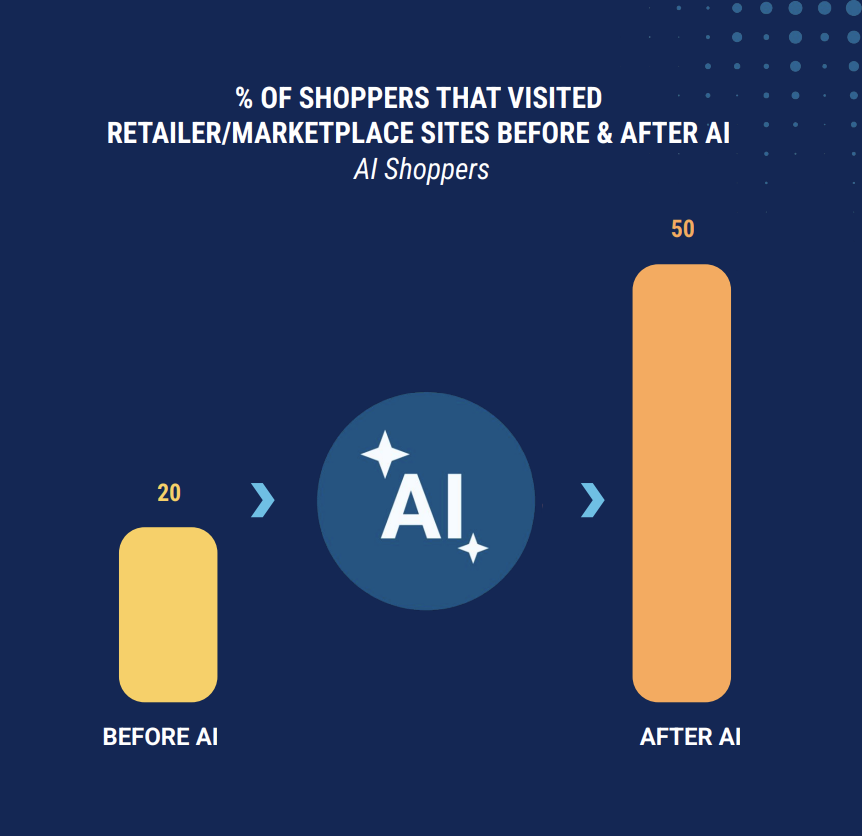
AI trust issues
AI search is still a work in progress. Marketers and shoppers alike are grappling with trust as AI chatbots face lawsuits over copyright and IP infringements, and hallucination persists.
“… the savvier brands are wrestling with a deeper question: what does it mean to be seen in an environment where the first audience is a model, not a human?” asked Jason Alan Snyder, co-founder of Artists & Robots, a creative intelligence studio.
Per the IAB, shoppers trust things like community forms, user reviews, search platforms, retailer marketplace sites, social media and news more than AI sources.
For the holiday shopping season specifically, more than half of shoppers “would rather face Black Friday crowds than lose another deal to bots online,” according to World, a web3 project started by OpenAI’s Sam Altman and Alex Blania.
An estimated 64% of consumers feel bots are stealing joy out of holiday shopping, causing competition in the marketplace for limited products, per the report. Even as agentic AI picks up and people turn to AI to do their shopping for them, nine out of 10 people say it’s important to verify they’re buying from a real person.
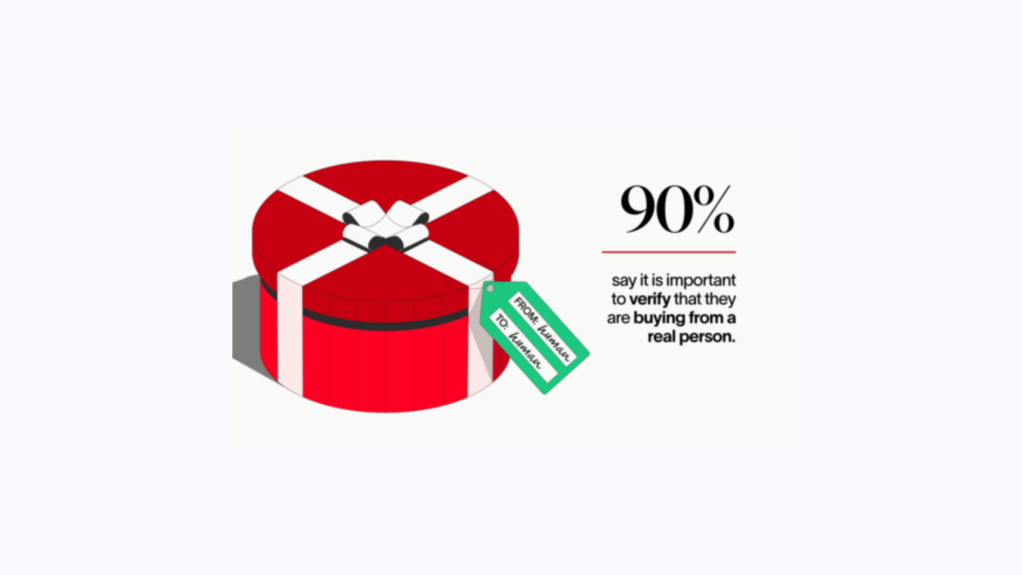
More in Marketing

Yahoo pauses IAB membership amid a series of quiet cost-saving measures
Yahoo pulls IAB board memberships, following job cuts as PE-owner reportedly reconsiders ad tech investments.

Target looks to e-commerce, advertising investments to help grow the business
Technology is one of the most important areas in which Target will invest with the hopes of returning to profit growth.

‘The conversation has shifted’: The CFO moved upstream. Now agencies have to as well
One interesting side effect of marketing coming under greater scrutiny in the boardroom: CFOs are working more closely with agencies than ever before.








